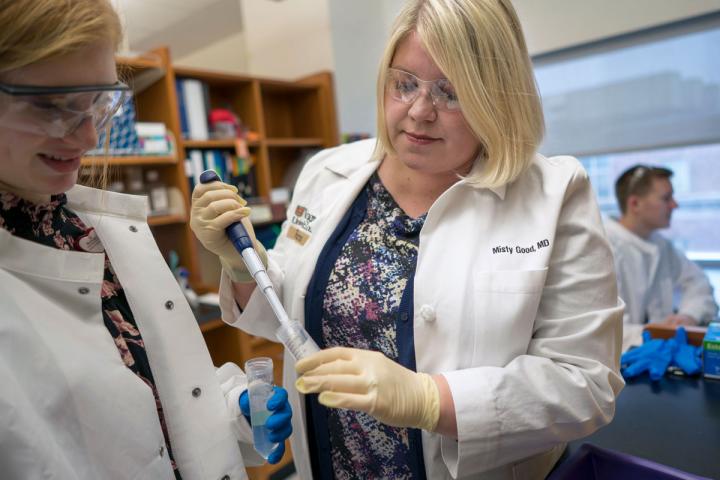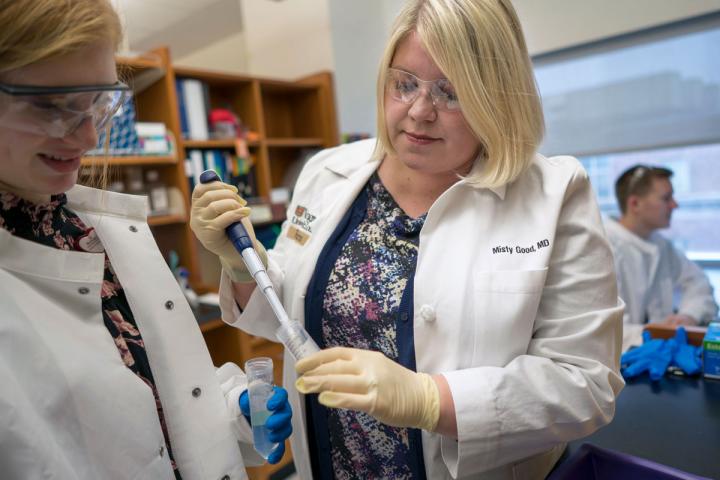
Credit: Matt Miller/Washington University
For young physician-scientists, obtaining research funding from the National Institutes of Health (NIH) can be a springboard to significant contributions to medicine and further professional opportunities. A lack of funding, meanwhile, can stall possible discoveries and short-circuit the careers of young scientists.
Previous research has noted declines in NIH funding for physician-scientists in general, including pediatric physician-scientists. One study noted a decline in the rate of NIH awards to pediatric departments from 23 percent to 16 percent during a recent 10-year span.
Now, a new, multicenter study that included Washington University School of Medicine in St. Louis has found that most NIH grants awarded to researchers in pediatrics during the past five years have been limited to physicians in senior positions at a small number of institutions. The findings indicate an overall downward trend in funding for pediatric research, particularly among early-career physician-scientists.
The study is published Jan. 16 in JAMA Pediatrics.
Although the NIH offers myriad research project grants, the study primarily focused on R01 grants. This is the NIH's most established funding source, and receiving one is considered a professional milestone, important for continued research, promotion and tenure. The researchers did not examine funding given by private groups and foundations.
"Novel scientific investigations, including those funded by the NIH as new R01s, are necessary to advance the field of pediatrics," said Misty Good, MD, the study's first author and an assistant professor of pediatrics at Washington University.
"A lack of funding also may prevent the discovery of potential treatments and preventive strategies for patients," added Good, a neonatologist who treats patients at St. Louis Children's Hospital and runs a research lab focused on necrotizing enterocolitis, a deadly gastrointestinal disease in newborns.
The study's researchers culled NIH databases for information on pediatric R01 grants given to scientists at medical institutions and hospitals from 2012 to 2017. They found 2,471 individual pediatric R01 grants awarded to 1,593 scientists. Of those, 907 (57 percent) were to pediatric scientists with medical degrees, often referred to as physician-scientists.
Among the new study's findings:
- More than half of the pediatric R01 awards to physician-scientists — 526 (58 percent) — went to senior-level physician-scientists.
- Fifteen institutions accounted for more than half — 1,561 (63 percent) — of the pediatric R01s awarded over the five-year period.
- Hematology-oncology topped the list of pediatric specialties for physician-scientists receiving the most R01 grants: 146 awardees (16 percent). The second- and third-highest specialties were, respectively, general academic pediatrics and infectious diseases, at 109 (12 percent) and 93 (10 percent).
- The majority of R01 physician-scientist awardees were male, had achieved full professor status, and many held senior leadership positions such as chief, chair or dean.
"The paucity of awards for junior scientists raises concern about the ability to motivate and develop young trainees to become pediatric physician-scientists," said senior author James Wynn, MD, of the University of Florida in Gainesville.
Researchers from the University of Iowa also contributed to the study.
"We hope that this study sheds light on the pediatric physician-scientist work force and continues to reinforce the need to provide programs and additional support for early-stage investigators," Good said.
###
Media Contact
Diane Duke Williams
[email protected]
314-286-0111
@WUSTLnews
Home
Original Source





